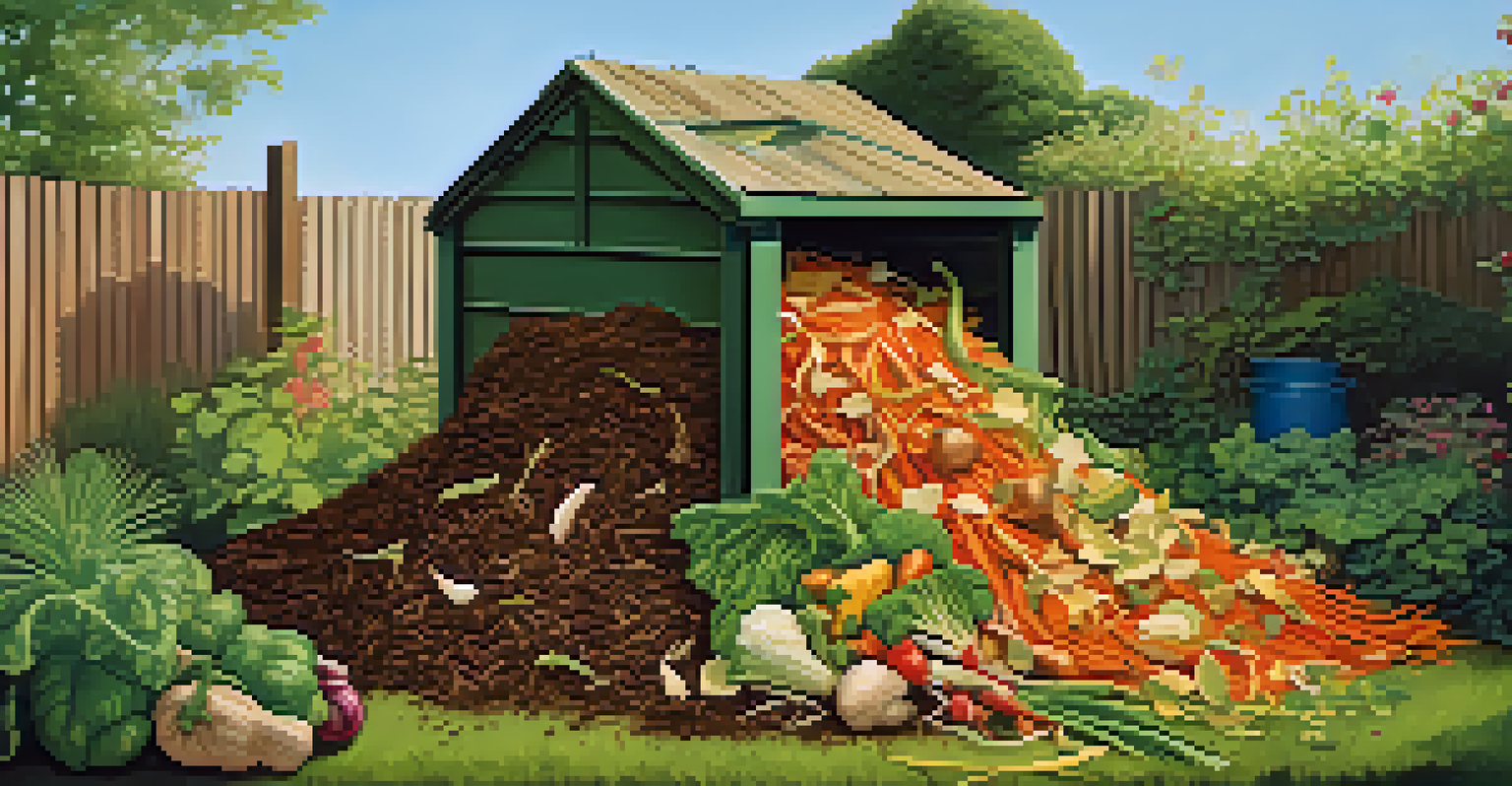Sustainable Gastronomy: Exploring Eco-Friendly Food Practices

Understanding Sustainable Gastronomy and Its Importance
Sustainable gastronomy refers to food practices that are environmentally friendly, socially responsible, and economically viable. It emphasizes the importance of sourcing ingredients that support local economies while preserving the planet’s resources. By focusing on sustainability, we can enjoy delicious meals without compromising the health of our environment or future generations.
Eating locally and seasonally is the best way to know where your food comes from and how it impacts the environment.
This approach to food encourages awareness of where our food comes from and how it impacts the earth. For example, choosing seasonal fruits and vegetables not only supports local farmers but also reduces the carbon footprint associated with transportation. In essence, sustainable gastronomy intertwines the pleasures of eating with the principles of environmental stewardship.
Ultimately, adopting sustainable food practices is not just a trend; it’s a necessary shift toward a more responsible way of living. As consumers, we hold power in our choices, and making informed decisions can lead to significant changes in the food industry. By embracing sustainable gastronomy, we contribute to a healthier planet and a more equitable food system.
The Role of Local and Organic Ingredients
One of the cornerstones of sustainable gastronomy is the use of local and organic ingredients. Sourcing food locally reduces transportation emissions and supports the local economy, creating a strong community bond. Moreover, organic farming practices minimize the use of harmful pesticides and fertilizers, ensuring that the food we consume is healthier for both our bodies and the environment.

For instance, visiting a farmer's market can be a delightful experience where you can connect with producers and learn about their farming methods. This not only fosters a sense of community but also allows you to make choices that align with sustainable practices. By choosing local and organic options, we contribute to biodiversity and support sustainable agricultural practices.
Embrace Local and Organic Foods
Choosing local and organic ingredients supports community economies and promotes healthier food practices.
Incorporating these ingredients into our meals often leads to fresher and tastier dishes, too. When you bite into a ripe, locally grown tomato, the flavor is incomparable to that of one shipped from far away. By prioritizing local and organic foods, we not only enhance our culinary experiences but also take meaningful steps toward sustainability.
Seasonal Eating: A Key to Sustainable Gastronomy
Eating seasonally is another vital aspect of sustainable gastronomy. When we align our diets with seasonal produce, we not only enjoy fresher flavors but also support farmers who grow what’s naturally available at different times of the year. This practice helps reduce the carbon footprint associated with out-of-season produce that often requires extensive transportation and artificial growing methods.
The future of food is not just about the food itself but about how it is produced, who produces it, and how it affects our planet.
For example, indulging in pumpkin dishes in the fall or enjoying strawberries in the summer connects us to the rhythm of nature. It encourages creativity in the kitchen as we adapt to the changing seasons and experiment with new recipes. Seasonal eating also promotes a deeper appreciation for the diversity of foods available throughout the year.
By choosing to eat with the seasons, we also help protect agricultural biodiversity and preserve traditional farming practices. This approach fosters a connection between consumers and their food sources, reminding us of the importance of nurturing the environment. Ultimately, seasonal eating is a delicious way to contribute to sustainability.
Reducing Food Waste: A Sustainable Practice
Food waste is a significant issue in today’s society, contributing to environmental degradation and resource depletion. Sustainable gastronomy places a strong emphasis on reducing food waste through mindful purchasing and cooking practices. By planning meals and utilizing leftovers creatively, we can significantly minimize the amount of food that ends up in landfills.
For instance, transforming vegetable scraps into flavorful stocks or repurposing stale bread into croutons not only reduces waste but also enhances our culinary skills. Additionally, composting food scraps can enrich soil health, creating a closed-loop system that benefits the environment. These small changes can have a big impact over time.
Reduce Food Waste Mindfully
Implementing strategies to minimize food waste can significantly impact environmental sustainability.
Taking responsibility for our food consumption helps foster a culture of sustainability. By being conscious of our food choices and looking for ways to reduce waste, we can contribute to a more sustainable future. Together, we can make a difference, one meal at a time.
Plant-Based Diets: A Sustainable Choice
Adopting a plant-based diet is one of the most effective ways to embrace sustainable gastronomy. Research shows that reducing meat consumption can significantly lower greenhouse gas emissions and conserve water resources. Plant-based foods generally require fewer resources to produce and can be more environmentally friendly than animal-based products.
Incorporating more plant-based meals into our diets doesn’t mean giving up on flavor or satisfaction. With the abundance of delicious fruits, vegetables, grains, and legumes available, it’s easier than ever to create satisfying meals that celebrate nature’s bounty. From hearty lentil stews to vibrant vegetable stir-fries, plant-based dishes can be both nutritious and delightful.
Moreover, exploring plant-based options can lead to a greater understanding of different cuisines and cooking techniques. It opens the door to experimenting with new ingredients, flavors, and textures. By embracing a plant-based lifestyle, we contribute to a healthier planet while enjoying a diverse array of culinary experiences.
Supporting Ethical Food Producers and Practices
Sustainable gastronomy also involves supporting ethical food producers and practices. This means choosing food that is produced in ways that prioritize animal welfare, fair labor practices, and environmental sustainability. By being mindful of where our food comes from, we can align our purchases with our values.
For example, seeking out certifications such as Fair Trade or Certified Humane can guide us in making ethical choices. These labels ensure that producers adhere to certain standards that promote sustainability and social responsibility. As consumers, we can use our purchasing power to support businesses that prioritize ethical practices.
Adopt Plant-Based Diets
Incorporating more plant-based meals can lower greenhouse gas emissions while providing delicious culinary options.
When we choose to support ethical food producers, we contribute to a more equitable food system. This not only benefits the producers but also encourages transparency and accountability in the food industry. By making informed choices, we can help create a food landscape that values people, animals, and the planet.
The Future of Sustainable Gastronomy
The future of sustainable gastronomy looks promising as more individuals and organizations recognize the importance of eco-friendly food practices. Innovations in sustainable farming, food technology, and community-supported agriculture are paving the way for a more resilient food system. As consumers become increasingly aware of their impact on the environment, the demand for sustainable options continues to grow.
Moreover, educational initiatives and programs are helping to raise awareness about the benefits of sustainable gastronomy. From cooking classes that focus on seasonal ingredients to community gardens that promote local food production, these efforts empower individuals to take action in their own kitchens. This shift toward sustainability is not just about food; it's a lifestyle choice that impacts our health and the planet.

As we look ahead, it’s essential to continue advocating for sustainable food practices. By supporting local farmers, reducing waste, and making ethical choices, we can contribute to a more sustainable food system. Together, we can cultivate a future where gastronomy and sustainability go hand in hand, ensuring a healthier planet for generations to come.